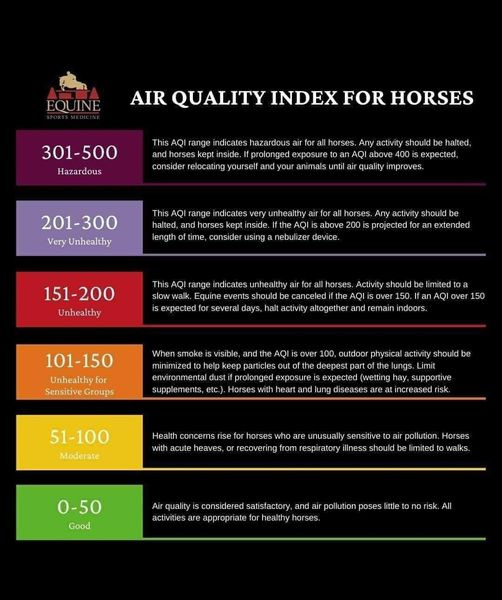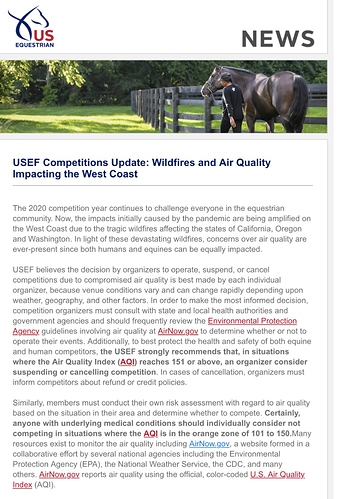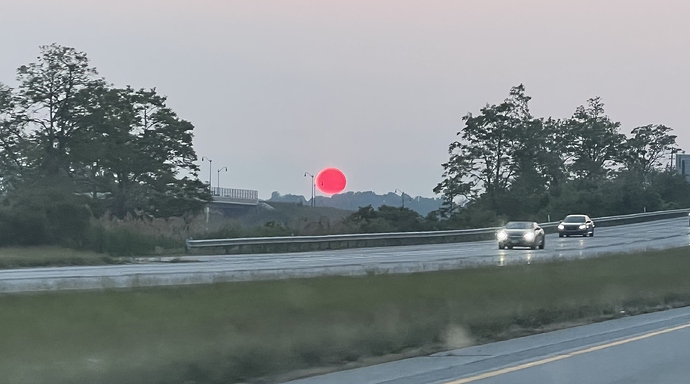I am curious how people are dealing with working horses and the air quality hazards we are facing due to the fires.
I live in the DC area. Have had a tickle in the back of my throat all week, ranging from “hmmm, need more water” to “oooh, that actually feels uncomfortable.” Rode in the woods on Monday, walked around for 30 mins yesterday (and neither of us was feeling into it), not even going to try to get on today.
If I’m feeling it in my lungs, I can’t imagine what it’s like for the horses. And if we’re having symptoms this far south, my heart goes out to all you COTHers and critters farther north, who are literally in the thick of it. Sending jingles for the safety and wellness of all.
You might find this document helpful. It was put out by Equestrian Canada and addresses heat, cold, and air quality.
It’s been hazy where I am, but the recorded air quality index has consistently fallen in the low risk category. It’s supposed to get worse over the next couple days though.
My gelding has had respiratory issues in the past associated with allergies, so I routinely check his respiratory rate anyway. If he’s having any symptoms I won’t ride and I’ll pull out the flexineb.
I live in an area where fires and air quality are a regular concern. I do keep a close eye on the air quality and will plan or schedule my training around it. I have my horses who are working hard on higher omega -3 as a result of our poor air quality and will occasionally give antihistamines on really bad days. This has helped.
I was going to go ride both of mine today but the AQI up there is 180, which is too high for anything but a walk. So, they will both stay inside in front of their hay nets, instead.
Living in Northern California I’ve unfortunately lived with this more and more the last few years. I follow the UCDavis medical center advice, which is just to not ride if there is any smoke evidence in the air, and let them recover. Which meant last fall my new horse got WAY too much time off, but better safe than sorry.
A quote from the article" Give your horse ample time to recover from smoke-induced airway insult. Airway damage resulting from wildfire smoke takes 4-6 weeks to heal. Ideally, plan on giving your horse that amount of time off from the time when the air quality returns to normal. Attempting exercise may aggravate the condition, delay the healing process, and compromise your horse’s performance for many weeks or months. It is recommended that horses return to exercise no sooner than 2 weeks post smoke-inhalation, following the clearance of the atmosphere of all smoke. Horses, like all other mammals, tend to have an irritation to particles, but should recover from the effects within a few days. "
Our horses aren’t even being turned out today. Being young and healthy racehorses, we can’t trust them not to bounce around like superballs on crack, so they’re staying in. DD is putting the nebulizer on all of them. It won’t hurt and will give her something to do.
I rode one very lightly yesterday, but will probably give both today off. We did leave them out, but my barn is very open so no real difference in air quality and they are all teenage mares that don’t generally get stupid.
@jvanrens And AGCO just issued a statement about air quality and the possibility of all things track related being cancelled.
I ride lightly yesterday, including my horse with EIPH and asthma because I didn’t know it was getting bad. She’s now off until the smoke clears… which could be end of next week.
Good to know. Do you have a link I can share with the DH and DD? The local horseman’s FB page posted earlier today that they are watching the conditions, but expect to be racing tomorrow night.
I’m not riding. It looks gross out and I can smell the smoke. I don’t want to risk causing an airway disease in one of my horses.
However, upperville is going on just a few miles away and people are riding.  I may be being paranoid, but no one here is going to suffer dire consequences from getting a few days off.
I may be being paranoid, but no one here is going to suffer dire consequences from getting a few days off.
@jvanrens. Woodbine Communications, on Twitter have just announced that both Woodbine and Woodbine/Mohawk have cancelled racing for tomorrow, and my trainer says it’s not looking good for Friday, either. The barn had horses in for both Thursday and Friday.
And if you go to the AGCO website you can see the Air Quality announcement. I don’t know how to link to it. Lol
Yesterday was the first day it was noticeable here. I attempted a very light ride but as soon as I picked up the trot, my horse started coughing and I called it quits. Not worth it! I’ve been pretty miserable myself. I even wore an N95 for my entire farrier appointment, and I still feel like crap. I don’t know how people in other parts of the world live like this all the time! And the poor horses, who can’t really escape it…though mine all seem chipper enough.
My friend who lives in CA sent me this as guidance, which reinforced my decision not to ride (AQI has been 130-170 here):
I’m in Eastern Ontario 
We have not ridden since Sunday morning and will likely have to give them all several more days off.
Our local dressage show on Sunday will likely cancel. A couple others have already made that decision.
I did hear someone say that it can take up to 4 weeks for lungs to ‘recover’ from the smoke.
I’m in NW IN & tonight, for the first time, local news had an Air Quality Alert.
So far, it’s a mild warning for the weekend.
But, there’s a show going on at the fairgrounds, starting tomorrow.
I’m not taking a horse, I’ll spectate.
But it makes me wonder if any horses will react to the conditions.
And hope those showing will choose wisely if the weather makes things less than favorable 
My own horses aren’t in work & so far being in pastures doesn’t seem to be having any effect from air quality.
The way I have always approached air quality is, if I’m not willing to go for a run (I never am if it’s terrible, I was in Florida the year they had the huge fires in the late 90’s for a bit) I won’t ride my horse. As it is we cannot shut them in like we can in our houses so they never really get a break from it.
For me I feel it’s unfair to ask them to work when I myself wouldn’t do it on my own.




